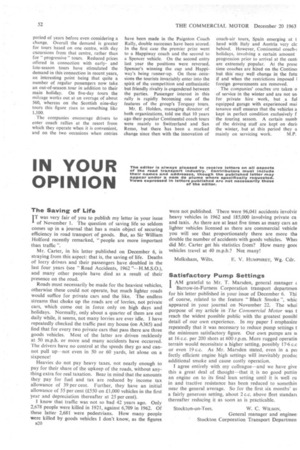IN YOUR OPINION
Page 54

If you've noticed an error in this article please click here to report it so we can fix it.
The Saving of Life IT was very fair of you to publish my letter in your issue 1 of November 1. The question of saving life so seldom comes up in a journal that has a main object of securing efficiency in road transport of goods. But, as Sir William Holford recently remarked, "people are more important than traffic ".
Mr. Carter, in his letter published on December 6, is straying from this aspect: that is, the saving of life. Deaths of lorry drivers and their passengers have doubled in the last four years (see "Road Accidents, 1962 "—H.M.S.0.), and many other people have died as a result of their presence on the road.
Roads must necessarily be made for the heaviest vehicles, otherwise these could not operate, but much lighter roads would suffice for private cars and the like. The endless streams that choke up the roads are of lorries, not private cars, which come out in force only on high days and holidays. Normally, only about a quarter of them are out daily while, it seems, not many lorries are ever idle. 1 have repeatedly checked the traffic past my house (on A365) and find that for every two private cars that pass there are three goods vehicles. Most of the latter are driven recklessly at 50 m.p.h. or more and many accidents have occurred. The drivers have no control at the speeds they go and cannot pull up—not even in 50 or 60 yards, let alone on a sixpence!
Heavies do not pay heavy taxes, not nearly enough to pay for their share of the upkeep of the roads, without anything extra for real taxation. Bear in mind that the amounts they pay for fuel and tax are reduced by income tax allowance of 39 per cent. Further, they have an initial allowance of 55 per cent (£550 on £1,000 vehicles in the first year and depreciation thereafter at 25 per cent).
I know that traffic was not so bad 42 years ago. Only 2,678 people were killed in 1921, against 6,709 in 1962. Of these latter 2,681 were pedestrians. How many people were killed by goods vehicles I don't know, as the figures were not published. There were 96,041 accidents involvir heavy vehicles in 1962 and 185,000 involving private ca and taxis. As there are at least five times as many cars an lighter vehicles licensed as there are commercial vehicle you will see that proportionately there are more tha double the number of accidents with goods vehicles. Whei did Mr. Carter get his statistics from? How many goo( vehicles travel at 40 m.p.h.? Not many!
Melksham, Wilts. E. V. HUMPHREY, Wg. Cdr.
Satisfactory Pump Settings I AM grateful to Mr. T. Marsden, general manager ( 1 Barrow-in-Furness Corporation transport departmen for his letter published in your issue of December 6. Thi of course, related to the feature "Black Smoke ", whic appeared in your journal on November 22. The whol purpose of my article in The Commercial Motor was t reach the widest possible public with the greatest possibl detail of our own experience. In my paper I emphasize repeatedly that it was necessary to reduce pump settings t the minimum satisfactory figure. Our own pumps are s( at 16 c.c. per 200 shots at 600 r.p.m. More rugged operatin terrain would necessitate a higher setting, possibly 17-6 c.c or even 19 c.c. As Mr. Marsden stated, even in a pei fectly efficient engine high settings will inevitably produc additional smoke and cause costly operation.
I agree entirely with my colleague—and we have give this a great deal of thought—that it, is no good puttin an engine on to its final lean setting until it is well ru in and tractive resistance has been reduced to somethin near the general average. So for the first six months' us a fairly generous setting, about 2 c.c. above fleet standar( thereafter reducing it as soon as is practicable.
Stockton-on-Tees. W. C. WILSON, General manager and enginee• Stockton Corporation Transport Departmen




























































































